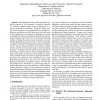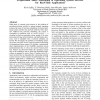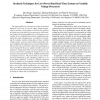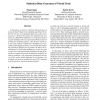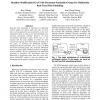104
Voted
RTSS
1998
IEEE
15 years 6 months ago
1998
IEEE
118
Voted
RTSS
1998
IEEE
15 years 6 months ago
1998
IEEE
Abstract: The QoS-based Resource Allocation Model (QRAM) proposed in [20] presented an analytical approach for satisfying multiple quality-of-service dimensions in a resource-const...
121
Voted
RTSS
1998
IEEE
15 years 6 months ago
1998
IEEE
We propose a unifying method for analysis of scheduling problems in real-time systems. The method is based on ACSR-VP, a real-time process algebra with value-passing capabilities....
107
Voted
RTSS
1998
IEEE
15 years 6 months ago
1998
IEEE
: The Time-Triggered (TT) model of computation is a model for the representation and analysis of the design of large hard real-time systems. Central to this model is the concept of...
97
Voted
RTSS
1998
IEEE
15 years 6 months ago
1998
IEEE
166
click to vote
RTSS
1998
IEEE
15 years 6 months ago
1998
IEEE
The energy efficiency of systems-on-a-chip can be much improved if one were to vary the supply voltage dynamically at run time. In this paper we describe the synthesis of systems-...
118
click to vote
RTSS
1998
IEEE
15 years 6 months ago
1998
IEEE
In this paper, we derive a statistical delay guarantee of the generalized Virtual Clock scheduling algorithm. We define the concept of an equivalent fluid and packet source and pr...
111
Voted
RTSS
1998
IEEE
15 years 6 months ago
1998
IEEE
105
Voted
RTSS
1998
IEEE
15 years 6 months ago
1998
IEEE
suitable disk layout and network transmission schedule to minimize allocated resources (buffer size, bandwidth, ..., etc.) with maximum resource utilization. In this paper, the rea...
110
click to vote
RTSS
1998
IEEE
15 years 6 months ago
1998
IEEE
Statistical Rate Monotonic Scheduling (SRMS) is a generalization of the classical RMS results of Liu and Layland [10] for periodic tasks with highly variable execution times and s...

